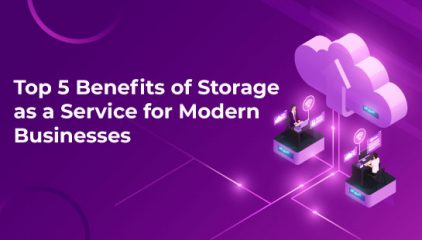Here’s everything one needs to know about cloud storage
Every year, countless small, medium and large-scale businesses are moving their respective data and physical onsite infrastructures to the cloud. To put things into perspective, as per the data put forth by a revered cloud storage provider in India, close to 90 % of IT professionals and businesses in the nation use cloud solutions.
But why?
Well, several reasons made the adoption of cloud solutions part and parcel of running a modern business. But before getting into the specific reasons that are responsible for making cloud solutions irreplaceable in the present-day corporate space, it is best to learn what cloud storage means.
What is cloud storage?
A form of data storage solution where digitized data is stored in servers located in remote (and secured) locations is known as cloud storage. These locations known as data centers are maintained by third-party cloud storage providers. The stored data is accessible by the owners of the same via private or public internet connections from all locations in the globe.
Why is cloud storage important?
As per the professional opinion of a cloud security expert associated with a leading cloud storage provider, several reasons make cloud storage important to businesses. Some of those reasons are mentioned in the sections below.
- Cost-effectiveness – Buying, maintaining and upgrading onsite data storage solutions is expensive. On the other hand, using cloud storage solutions is relatively cheaper, especially for small-to-medium scale businesses.
- Increased agility – Cloud storage solutions can be scaled up or down as per the requirements of a business in a matter of minutes. Hence, organizations that need to remain agile in a bid to stay ahead of their rivals choose cloud storage
- Faster deployment – It is way faster to set up a cloud storage solution for a business especially compared to setting up an onsite data storage centre.
- Efficient data management – Data management is pretty easy through cloud storage solutions thanks to a myriad of value-added services cloud solutions providers offer to their corporate clients.
- Business continuity – In case of a natural disaster or data breach where the onsite data storage solutions of a business are either inaccessible or destroyed, cloud storage solutions can help the affected business to bounce back from the crisis and come online thus allowing the enterprise to keep its position in the market as well as its reputation among its stakeholders intact.
How does cloud storage work?
Cloud storage solutions run using encrypted networks that connect remote servers with the clients that use these servers to store their data. Clients automatically or manually upload data to these servers using public or private internet connections. The uploaded data is then saved within a virtual machine and then permanently stored on a physical server. In a bid to keep the cloud storage solution secured against natural disasters or cyber attacks, cloud storage solution providers often save multiple copies of their client’s data across multiple data centres located all over the world. In case a client needs additional storage space, the cloud storage solution provider would allocate additional virtual machines to the client. On the other hand, when the demand ceases, the allocated resources are either put on standby or allocated to other clients as per their bespoke requirements. Accessing cloud storage services is pretty easy as clients can do so using a generic internet connection, a browser or a mobile application.
What are the types of cloud storage?
As per the professional opinion of an expert associated with Network Techlab India Private Limited – one of the revered cloud storage providers in cloud computing from India, there are three primary types of cloud storage and they are as follows.
- Object storage – otherwise known as object-based storage is primarily set up for clients who upload a ton of unstructured data.
- File storage – cloud solutions are set up for clients that need to store data and access the same using servers as well as applications using shared file systems.
- Block storage – cloud solutions store blocks of data on storage area networks. Each data block is separately stored in a bid to keep the overall efficiency of the SANs allocated to a particular client intact.
What cloud storage requirements should you consider?
While looking for a cloud storage solution provider, one must ensure that the solution entails the following two attributes.
- Durability – It is always a good idea to go for cloud solutions providers that can guarantee their services would be able to entail 99.99% annual durability.
- Security – The next most crucial attribute of an ideal cloud solution provider is to ensure that all the cloud solutions it offers to its clients are backed by encryption and authentication protocols.
What are cloud storage use cases?
Here are some of the most common use cases for cloud storage solutions.
Analytics and data lakes
The primary application of cloud storage solutions is to offer data scientists a pool of useable and relevant data that they can use to run data analysis for the company that employs them or the companies whose data they analyse in a bid to come up with information that can be used to keep the businesses in question ahead of their respective rivals. Cloud storage also enables one to set up centralized data repositories known as data lakes where one can store all their structured and unstructured data.
Backup and disaster recovery
Cloud storage solutions allow businesses to back up their data which can be used in case the onsite data storage of a business is destroyed in a disaster or due to a cyber attack.
Software test and development
Modern software development companies rely on cloud-based software testing and development as this is a faster way to develop projects. Furthermore, cloud storage solutions also allow software development studios to remain flexible and efficient all the while ensuring the expenses of running software testing are kept under control.
Cloud data migration
Cloud storage solutions allow businesses to modernize their proprietary physical IT infrastructures all the while enabling the organization in question to become more efficient and protected against natural or man-made threats.
Compliance
Cloud storage solutions also help businesses to comply with data security protocols, regulatory requirements and internal policies.
Cloud-native application storage
Cloud-native applications need unlimited storage and since cloud storage solutions allow tech companies and software development studios to scale up or scale down the resources they need for their cloud computing requirements, adopting cloud storage solutions is the way of the wise in this case.
Archive
It is best to store archived data in the cloud since this is a cost-effective decision especially when compared with the cost of running and maintaining in-house storage solutions.
Hybrid cloud storage
Hybrid cloud storage is a novel cloud-based architecture where certain businesses can control the location where a set of data will be stored and at the same time control how peaks in resource demand are met.
Database storage
Cloud storage solutions also benefit organizations that need to store, edit and maintain large databases. Maintaining onsite data centers is a risky and costly affair and businesses can keep these additional liabilities at bay by partnering up with leading providers of cloud storage solutions.
ML and IoT
IoT projects need large packets of data delivered to and from the points of request quickly. Cloud storage solutions can deliver the prerequisites of Machine Learning and Internet Of Things-based projects in the most efficient manner.
Is cloud storage secure?
Yes, cloud storage solutions are very secure especially when compared to traditional onsite (and portable) data storage solutions that businesses relied heavily on till late 2019. The primary reason is the barrage of data protection measures leading providers of cloud storage solutions put in place which include –
- Single Sign-On (SSO)
- Multi-Factor Authentication (MFA), etc.
How Network Techlab could help in cloud storage requirements?
Network Techlab India Private Limited is one of the leading cloud storage providers in India. The IT solutions provider offers Backup as a Service which is promoted as AtmosVault and is designed to protect client data, provide automated data backups, and ensure seamless data recovery suitable for apps, files, system images and folders. Network Techlab’s AtmosVault cloud storage solution is compatible with all leading S3-compatible cloud storage services such as AWS and MS Azure using local or network shared drives. For more details, please call +91 8879004536 or send an email to info@netlabindia.com.








